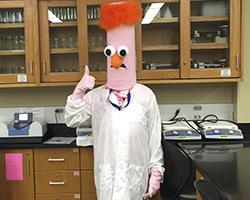Dr. Chris Lue

Education:
Ph.D., Chemistry-- Emory University (2008)
B.S., Chemistry-- Washington and Lee Univeristy (2001)
Philosophy of education:
As a sophomore in a large public high school, I was both engaged and challenged by my chemistry teacher. Her expectations were very high, but most students, including me, thrived on account of her dedication and mentoring. She piqued my interest in chemistry, and I became passionate in pursuing a college degree in chemistry.
I enrolled at a small liberal arts college whose staff was dedicated to enrich, inspire, and guide their students. The small personalizations I experienced helped me make connections and thrive. The admission’s counselor knew me by name. My advisor, along with the university president, welcomed me and other students to his home. Professors’ doors were always open. The summer after my sophomore year, I was asked to join a research project to create a computer program to run a cavity ringdown laser absorption spectroscopy (CRLAS) spectrometer. This project encouraged me to pursue a doctorate in physical chemistry.
My days at a liberal arts college allowed me to engage in intrinsic learning. I was able to take classes simply because I was curious. During my senior year, I took a class in rhetoric, which helped me effectively communicate my thoughts so that they were clear and concise. Up until that point in my education, little attention was given to writing except for the papers required in English literature classes.
As a graduate student sitting through direct recitations from the textbook to working freely in a research laboratory, I experienced the worst and the best in pedagogy. My advisor gave me the flexibility to establish my own schedule in the laboratory and encouraged me to explore my own problem solving methods. With successes, I was rewarded with trips to present my findings at scientific meetings. It also was in graduate school where I realized how much more there was to learn about scientific writing. Only after receiving a bound copy my of dissertation, did I grasp how much my scientific writing had improved, thanks in part to the persistence of my advisor.
After completing my doctorate, I became a postdoctoral research associate at the Arkansas Center for Laser Applications and Science at Arkansas State University Jonesboro. In addition to carrying out CRLAS experiments, I mentored a Master of Science student. My experiences throughout my years of education enabled me successfully to guide this student, who is now pursuing a doctorate in physical chemistry at Emory University.
Let me close by saying, I believe each student is unique. It is an educator’s responsibility to build upon that uniqueness to facilitate learning. Engagement of the students is a challenge best met by making the material interesting and relevant to the students, thereby enticing them to learn. Research is a great tool to encourage learning. It builds upon the intrinsic character of human beings, our curiosity. We are eager to explore and learn. The inherent nature of learning forms the core of any philosophy of education. It includes but goes beyond preparing students for “successful” careers.
Research Interest:
I am laser spectroscopist by training. I am interested in using laser spectroscopy as a tool to teach physical chemistry concepts to advanced undergraduate students. My past research has included using matrix isolation spectroscopy to study the electronic structure of actinide containing molecules, i.e., heavy metals. These molecules are unique because they have "f" electrons involved in chemical bonding.
I have also used cavity ringdown laser absorption spectroscopy to study the vibrational overtones of molecules related to explosives. The goal of this project, which was funded by the US Army RECOM Night Vision and Electronics Sensors Directorate, was to develop an optically based instrument to replace bomb-sniffing dogs.
